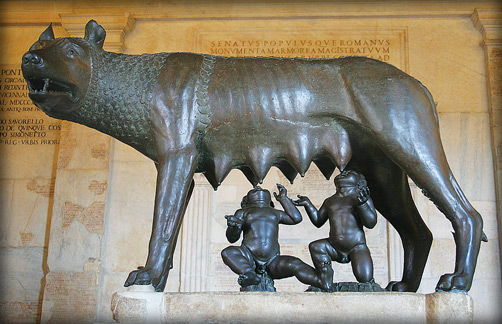Romans, the founders of Western civilisation
By Amal Hewavissenti
Rome emerged on the world scene with the decline and fall of the
Greek civilisation. It was Rome which highlighted and preserved the
total splendour of Greeks to transfer it to the future world. Being a
major city in Italy, it was discovered in 753 BC and was made a republic
around 200 years later.
The establishment of the city of Rome is supported by several
legends. A popular legend says that the city was built and developed by
two brothers bred up by a she wolf. The two brothers specially Romulus
had organised a large army and recaptured the city from the enemies.
Romulus, together with his brother Remus established the city and named
it Rome.
|

The Bronze statue of the She-Wolf suckling the twins Romulus
and Remus. Traditionally it has been attributed to the
Etruscans and dated to the 5th century BC. |
The Latini, a Latin-speaking people, however, captured the city of
Rome from its Etruscan Kings in 509 BC. As Romans, they virtually spread
their life style, their laws and their language throughout Italy then
over the Mediterranean region and much of Europe.
Wherever the Romans went as conquerors, they took particular care to
establish their own way of life. Although many local customs survived,
it is really possible to find "Roman every day life" throughout the
empire.
The central government is Rome demanded the farmers to work on as
much land as possible and new farm houses and estates began to appear.
Roman towns were generally well planned with straight streets dividing
the town into regular segments or blocks. The wealthy lived in private
houses with rooms for slaves and a secluded garden.
Roman towns had a regular supply of water and an efficient system of
sewage disposal. In the Roman army, soldiers were organised into legions
and each legion was composed of about 500 men.The legionary solders were
well armed and fought as a ground force while cavalry fought on horse
back.
The army helped create the Roman world by conquering countries,
constructing forts and keeping Roman controlled countryside secure from
enemy attacks. Boundaries to the Roman world were established sometimes
using rivers, mountains or seas as a barrier. Inside these boundaries,
the Romans created provinces where the Romans encouraged the newly
conquered peoples to live just like the Romans. They introduced their
religion into the provinces and established temples for gods and
goddesses such as Minerva, Jupiter and Juno.
At first, Rome was a republic. People with substantial property were
allowed to vote for the politicians who formed the central government.
Each year, one was elected to lead the government and one to command the
army.
In the second century BC, politicians began to battle with each for
supreme power and in the next century, a civil war broke out. Julius
Caesar defeated a rival politician Pompey and made himself dictator of
Rome. The next dictator was Octavian who became an emperor by the name
of Augustus in 27 BC. This was the beginning of the period in Roman
history called "empire".
The emperor decided who should rule and handed out important tasks to
those he could possibly trust. Under the rule of the emperors, Rome
gradually conquered an even greater area.
Julius Caesar
Julius Caesar was a powerful Roman general with great ambitions. He
used his vast army to win a civil war against his political rivals and
raise himself the sole ruler of the mighty Roman empire. Having served
in the army and held various public offices, Caesar became a successful
politician. He was in charge of the administration of the Roman State
and the armed forces even though he held power jointly with another
consul. From there he conquered a massive new area in Gaul and Germany
and invaded Britain twice in 55 and 54 BC.
Caesar was a very powerful leader with a huge army under his control
and was determined not to disband his troops, as he should have done by
law. Following victories at civil wars in Rome, he was appointed
'dictator for life' making him the sole ruler. Finally he was stabbed to
death outside the parliament building.
As Caesar captured the area up-to the river Rhine and earned public
admiration for his victories, his power increased dramatically. He made
clear changes in the empire which had earlier been a republic.
Having failed to resist Caesar's power, Pompey, the leader in the
Senate fled to Egypt but was followed by Julius Caesar. He killed
Pompey. Here he met Cleopatra the Egyptian empress and assumed divinity
to the gradual displeasure of the Roman people.
Roman legacy
The Latin language developed into many European languages spoken
today including Spanish, Italian and French. Most European countries
have adopted Roman law as the basis of their law. The English alphabet
is Roman and the English names for the months are Roman. The Roman
numerals are often used.
Rome had a rich tradition of art which was preliminarily nourished by
Greek traditions. Romans were well versed in sculpture (the head of
Augustus Caesar and the statue of Julius Caesar for instance).
Their techniques of architecture surpassed those which existed
elsewhere in the world. (The temple of Pantheon and the Colosseum for
example). Their techniques of construction and architecture provided
ideal archetypes for the western countries
- the western civilisation. |

